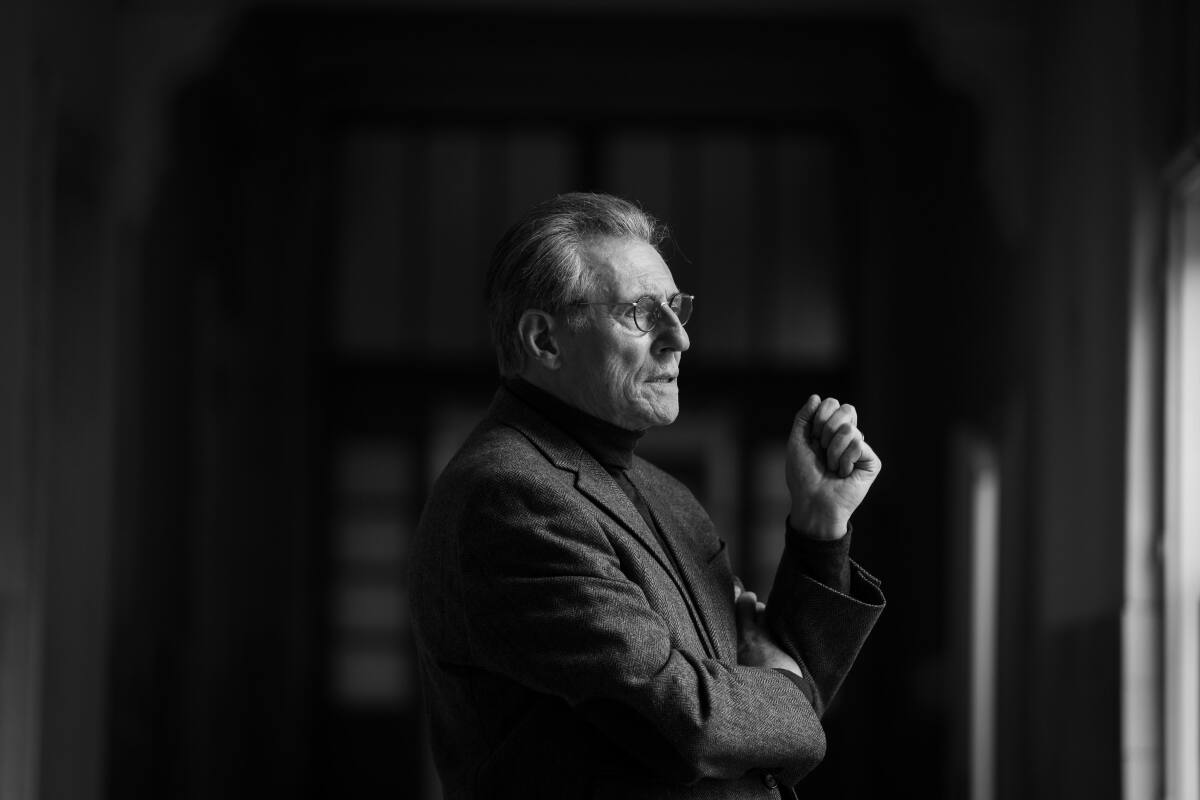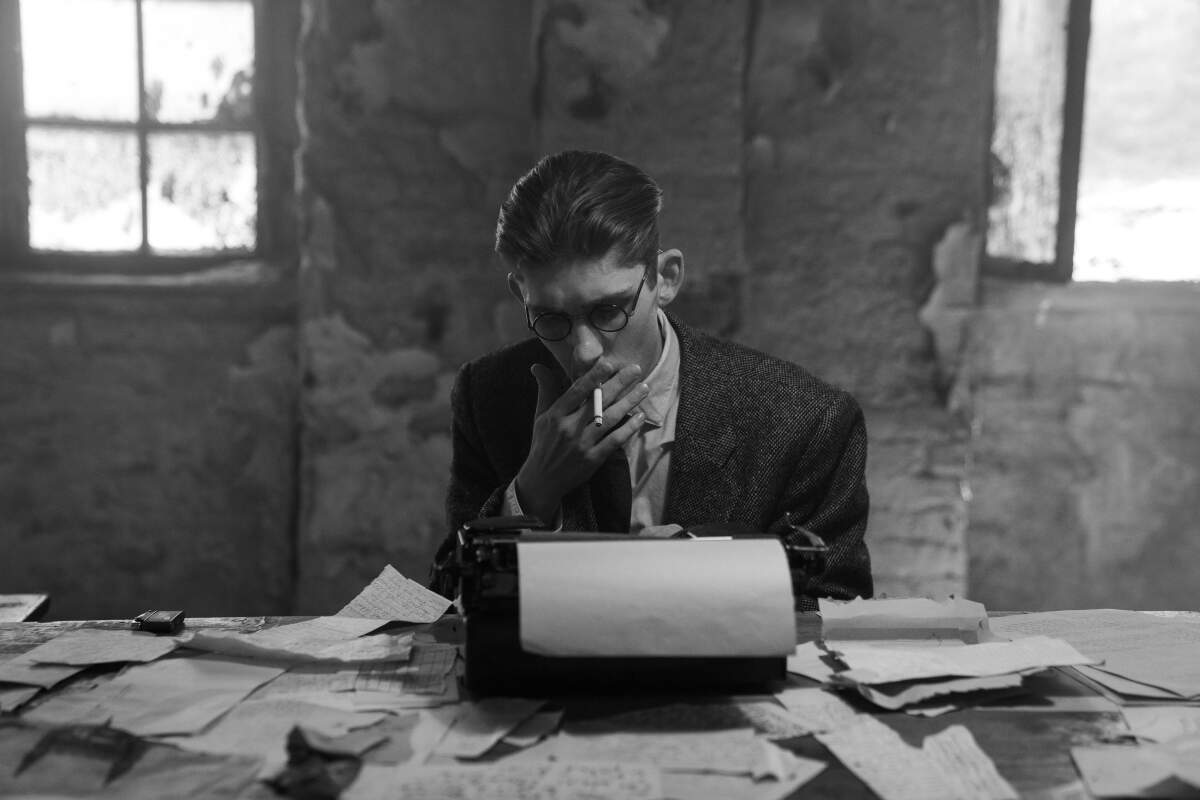Review: In âDance First,â a biopic of Samuel Beckett, Gabriel Byrne portrays the man, not the myth

It would be hard to imagine a genre more antithetical to the modernist sensibility of Samuel Beckett than the biopic. The Irish writer who relocated to Paris, found inspiration in the French language and became one of the most innovative literary artists of the second half of the 20th century, was allergic to the uplifting pieties and sentimental profundities that are the mainstay of screen biographies.
Publicity and self-promotion were anathema to this most private of authors, who died in 1989. Itâs safe to say that he wouldnât have relished being the subject of a movie. When Beckett learned that he was the recipient of the 1969 Nobel Prize in Literature, he took refuge in a hotel in Tunisia out of fear of the celebrity circus. In short order, he let the Swedish officials know that he was honored by the award but wouldnât be able to attend the ceremony.
âDance First,â James Marshâs film about Beckettâs life shot in sharp black and white by cinematographer Antonio Paladino, doesnât let this detail stand in the way of a conventional opening. The film begins with Beckett (Gabriel Byrne), dressed as though for a funeral, at the Nobel Prize event celebrating him in Stockholm. âQuel catastrophe!â he mutters to his wife, Suzanne Dechevaux-Dumesnil (Sandrine Bonnaire), as his literary praises are sung from the podium.
Credible biographical sources attribute the catastrophe comment to Beckettâs wife, who was equally averse to the spotlight. But the setup by screenwriter Neil Forsyth boldly swerves from phony realism to unabashed surrealism.
In a break with verisimilitude, to say nothing of decorum, Beckett storms the stage, grabs the check and starts noisily climbing the side wall to escape public scrutiny. Making his way to an archaic locale that might be the setting for a Greek tragedy or even one of his own plays, he engages in a purgatorial dialogue with his alter-ego.

Byrne, playing opposite himself, brings these sides of Beckettâs consciousness to dialectical life. Somber and remorseful, his Beckett in formal attire explains that he has accepted the award so that he can give the money away. But his tweedy and serenely skeptical Beckett double pointedly inquires, âWhose forgiveness do you need the most?â
The film is divided into retrospective chapters on those loved ones with a claim on Beckettâs conscience. This framing device, which has the clunky air of a middlebrow play, provides a convenient if stagy way of breaking down his biography into manageable parts.
The filmâs title invokes a line in Beckettâs âWaiting for Godotâ that gives dancing natural precedence over thinking. But âDance Firstâ has otherwise little in common with Beckettâs absurdist aesthetic.
With his ruthless dedication to minimalism, Beckett reinvented whatever artistic form he happened to be working in. In plays such as âWaiting for Godotâ and âEndgame,â novels such as the Beckett trilogy (âMolloy,â âMalone Diesâ and âThe Unnamableâ) and even âFilm,â his 1965 foray into screenwriting, he divests the work of all inessentials, spurning conventional expectations and discovering what can be communicated when all the window dressing has been swept away.
Meaning isnât imported into Beckettâs work but enacted through a perfect alignment of style and content. By contrast, Forsythâs screenplay for âDance Firstâ serves as a container for biographical reportage and interpretation. Thereâs a journalistic quality to the movie, which delivers a readily digestible summary of Beckettâs life, with all the important moments neatly enumerated.
What redeems the film is the humane attempt to reach beyond the myth to access the man. Byrneâs Beckett may be less austere, outwardly and inwardly, than the authorâs prevailing image. Exuding a weary melancholy, the actor betrays an incongruous longing for the confessional, unflinchingly depicting the elderly Beckett stoically dragging his carcass to the finish line. Physical travail being an inexhaustible source of black comedy and a recurring metaphor for the human condition in Beckettâs writing, the depiction of mortal decline is on point.
But an air of fabrication hangs over the film, even as it hews to a factual outline. In distilling Beckettâs journey into a series of brisk, self-contained chapters, âDance Firstâ canât help distorting and over-dramatizing.
Weâve mapped out 27 of the best movie theaters in L.A., from the TCL Chinese and the New Beverly to the Alamo Drafthouse and which AMC reigns in Burbank.
Beckett was known to have had a tense relationship with his demanding and disapproving Protestant mother, May (Lisa Dwyer Hogg), the first stop on the feted authorâs guilt trip. The young Beckett (played with intriguing self-possession by Fionn OâShea) fled Ireland in part to slip beyond her iron grip, but the film doesnât suggest other dimensions to a bond that would haunt Beckettâs work throughout his career.
The section on Lucia Joyce (a wild GrĂĄinne Good), James Joyceâs mentally ill daughter who convinced herself that Beckett would marry her, and the scenes chronicling Beckettâs involvement in the Resistance during World War II are condensed in ways that seem spurious. But the actors have moments that transcend the recap treatment.
The interactions between OâSheaâs Beckett and Aidan Gillenâs James Joyce, an early mentor who resists the role but is ultimately won over by the young manâs reverence and rigor, are handled with welcome complexity. Gillenâs Joyce recognizes not only a prodigy in Beckett but also a potential husband for his unstable daughter â a scheme that galvanizes his no-nonsense wife, Nora (Bronagh Gallagher), who is far less subtle in her manipulations.
Beckettâs aloofness, his ability to resist falling captive to other peopleâs needs, enables him to become the Great Writer, but at a cost that becomes more apparent as the film shifts to Suzanne (played by Bonnaire as the mature wife and LĂŠonie Lojkine as the girlfriend who makes herself indispensable, romantically and practically, to him). Bonnaire and Lojkine preserve not only the characterâs dignity but also her farsighted intelligence and tactical discretion.
Suzanne understands the assignment of being Beckettâs wife, standing guard against anything that could detract from his higher mission. Itâs not clear that Beckett would have realized his gifts without the stability she provided. He was loyal, after his own fashion, to the woman who was at his bedside as he recovered from a near-fatal stabbing in a random incident of street violence in 1938. She is lovingly and courageously at his side during their dangerous war years working with the Resistance.
When Barbara Bray (Maxine Peake), the BBC script editor who becomes Beckettâs long-term mistress, enters the story, Suzanne carefully circumnavigates the treacherous marital waters. The pain that Beckett inflicts on both women registers silently on his handsome craggy face. He might be selfish, but it would be a mistake to think him heartless.
Language is inadequate to the suffering he has wrought, but Beckett manages to give it artistic form in âPlay,â his daring one-act in which a husband, wife and mistress rehash their story of infidelity at warp speed while planted in funeral urns in some indeterminate afterlife.
Beckett might have a reputation for bleakness, but he was also a sporting man who loved rugby, cricket, tennis, attractive women, male friendship and good whiskey. OâShea has room to encompass this other Beckett, but Byrneâs reclusive version of the character seems like he might be more at home in a monastery or academic library.
Still, the emotional acuity of a writer who felt things too deeply to stoop to cheap sentiment comes through. âDance Firstâ may not be especially Beckettian, but it personalizes a figure who, destined for the pantheon, never doubted that he was human â all too human.
'Dance First'
Not rated
Running time: 1 hour, 40 minutes
Playing: Opens Friday, Aug. 9 at Laemmle Monica Film Center, West Angeles; Laemmle Town Center, Encino
More to Read
Only good movies
Get the Indie Focus newsletter, Mark Olsen's weekly guide to the world of cinema.
You may occasionally receive promotional content from the Los Angeles Times.












